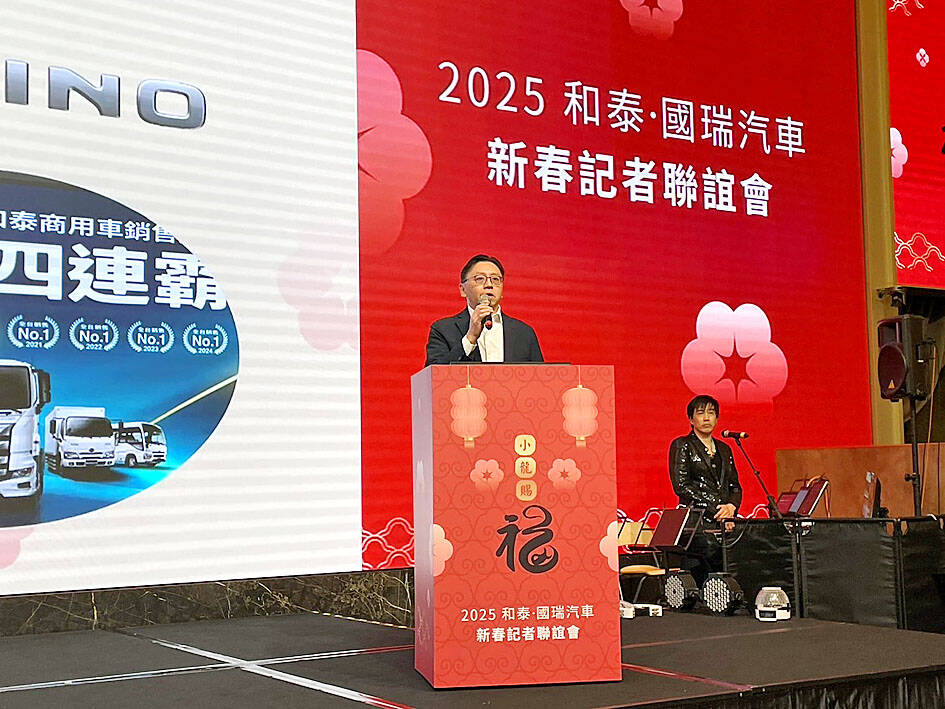Hotai Motor Co (和泰汽車), which distributes Lexus, Toyota and Hino models in Taiwan, yesterday said it is seeking a moderate increase in auto sales this year, aided by the government’s vehicle trade-in program and strong promotion efforts by car brands.
“Despite lingering global economic and political uncertainties as well as unpredictable monetary policies by major central banks, Taiwan’s auto market would hold resilient with new car sales surpassing 450,000 units this year,” Hotai president Justin Su (蘇純興) told a news conference.
Su attributed his positive outlook to the government’s new vehicle subsidy that is due to expire early next year and would prompt potential car buyers to take action this year.

Photo: CNA
Robust promotion campaigns by auto brands and the stable arrival of imported vehicles would also support the market, he said.
New car sales for its three brands might reach 165,000 units this year, representing a 3.8 percent rise from the 159,000 units sold last year, its second-best performance, Hotai said.
That target would suggest a market share of 36.7 percent, up from 34.9 percent last year when the company’s revenue rose to a high of NT$270 billion (US$8.19 billion), Su said.
Hotai would introduce several new models including the Toyota Alphard PHEV, the new Land Cruiser 250 and the GR Supra Track Edition, the company said.
Lexus would continue its Lexus Electrified strategy, expanding its lineup to meet growing demand for diverse powertrain options, it said.
On the commercial front, Hotai aims to lead Taiwan’s transition to hydrogen-powered vehicles, Su said.
The Toyota H2 City Gold hydrogen bus, which passed safety inspections late last year, is on track to become the first approved hydrogen bus in Taiwan, he said.
“With a robust pipeline of new models and an aggressive sales strategy, Hotai is gearing up for another profitable year,” he said.
Last year new vehicle sales totaled 457,830 units with Taiwan’s auto market stabilizing and most backlogged orders from a year earlier being fulfilled, Su said, adding that Hotai remained Taiwan’s top car distributor for the 23rd consecutive year.
Toyota alone contributed to 125,000 new vehicle registrations, accounting for a 27.4 percent market share, Hotai said.
The Corolla Cross remained the best-selling vehicle for the fourth consecutive year, while the Town Ace, RAV4 and Yaris Cross ranked second through fourth respectively, solidifying Toyota’s dominance in the local market, it said.
In the luxury segment, Hotai sold more than 28,000 Lexus vehicles, capturing a 24.7 percent market share and reaffirming its leadership position in Taiwan’s premium car market.

Taiwan Semiconductor Manufacturing Co (TSMC, 台積電) would not produce its most advanced technologies in the US next year, Minister of Economic Affairs J.W. Kuo (郭智輝) said yesterday. Kuo made the comment during an appearance at the legislature, hours after the chipmaker announced that it would invest an additional US$100 billion to expand its manufacturing operations in the US. Asked by Taiwan People’s Party Legislator-at-large Chang Chi-kai (張啟楷) if TSMC would allow its most advanced technologies, the yet-to-be-released 2-nanometer and 1.6-nanometer processes, to go to the US in the near term, Kuo denied it. TSMC recently opened its first US factory, which produces 4-nanometer

GREAT SUCCESS: Republican Senator Todd Young expressed surprise at Trump’s comments and said he expects the administration to keep the program running US lawmakers who helped secure billions of dollars in subsidies for domestic semiconductor manufacturing rejected US President Donald Trump’s call to revoke the 2022 CHIPS and Science Act, signaling that any repeal effort in the US Congress would fall short. US Senate Minority Leader Chuck Schumer, who negotiated the law, on Wednesday said that Trump’s demand would fail, while a top Republican proponent, US Senator Todd Young, expressed surprise at the president’s comments and said he expects the administration to keep the program running. The CHIPS Act is “essential for America leading the world in tech, leading the world in AI [artificial

REACTIONS: While most analysts were positive about TSMC’s investment, one said the US expansion could disrupt the company’s supply-demand balance Taiwan Semiconductor Manufacturing Co’s (TSMC, 台積電) new US$100 billion investment in the US would exert a positive effect on the chipmaker’s revenue in the medium term on the back of booming artificial intelligence (AI) chip demand from US chip designers, an International Data Corp (IDC) analyst said yesterday. “This is good for TSMC in terms of business expansion, as its major clients for advanced chips are US chip designers,” IDC senior semiconductor research manager Galen Zeng (曾冠瑋) said by telephone yesterday. “Besides, those US companies all consider supply chain resilience a business imperative,” Zeng said. That meant local supply would

Servers that might contain artificial intelligence (AI)-powering Nvidia Corp chips shipped from the US to Singapore ended up in Malaysia, but their actual final destination remains a mystery, Singaporean Minister for Home Affairs and Law K Shanmugam said yesterday. The US is cracking down on exports of advanced semiconductors to China, seeking to retain a competitive edge over the technology. However, Bloomberg News reported in late January that US officials were probing whether Chinese AI firm DeepSeek (深度求索) bought advanced Nvidia semiconductors through third parties in Singapore, skirting Washington’s restrictions. Shanmugam said the route of the chips emerged in the course of an